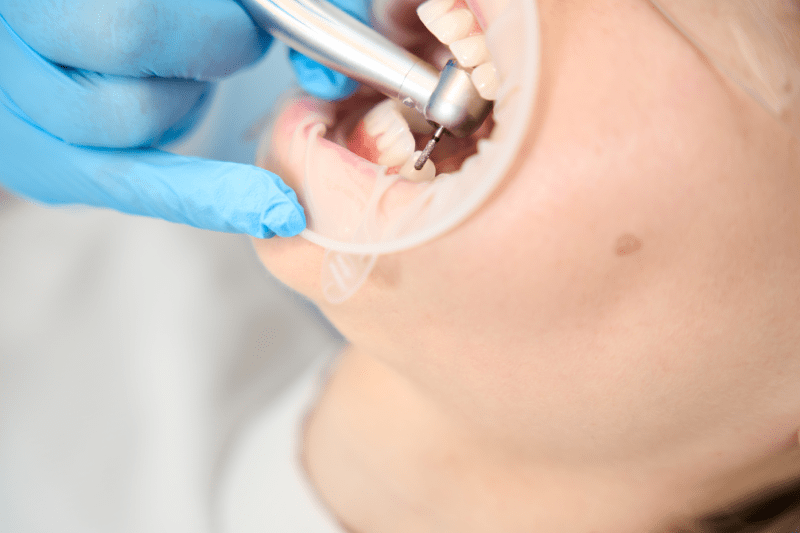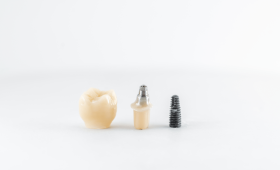What Are Dental Implants and When Are They Applied?
A dental implant is an artificial tooth root made of titanium that is placed into the jawbone to replace missing teeth. It fuses with the jawbone (osseointegration) to form a solid foundation, upon which a prosthetic tooth, bridge, or denture is attached. Implants can be applied in a wide range of cases, from a single missing tooth to a completely toothless jaw. It is one of the most preferred treatment methods as it provides the closest feeling and function to natural teeth. It is an ideal solution for individuals who have a strong jawbone structure and good overall oral health.
What is the Cost of a Dental Implant in Patra, Greece?
In Patra, dental implant prices are high, similar to other European cities. The price for a single implant can generally range from 1,200 Euros to 2,500 Euros, depending on the brand used, the dentist’s experience, and the quality of service offered by the clinic.
This price usually includes the implant itself and the abutment (the part placed on the implant), but the cost of the porcelain crown that will go on top is calculated separately. The total cost can increase significantly with comprehensive treatments or when additional procedures such as bone grafting are required.
Why Are Dental Implant Prices More Affordable in Turkey?
The main reasons for the more affordable implant prices in Turkey are the exchange rate advantage and low general operational costs. Patients traveling to Turkey can receive the same quality of service for a much lower price thanks to the high value of the Euro against the Turkish Lira. Furthermore, the rent, labor, and other operating expenses of clinics and laboratories are lower compared to Western European countries. These economic advantages make Turkey a popular destination for dental tourism.
What Are the Advantages of Getting Dental Implants in Greece?
The most significant advantage of getting a dental implant in Greece is the geographical proximity of the treatment process. This means easier follow-up appointments and quick access in case of emergencies. Patients being treated in Patra can receive services in an environment that is close to their own culture and language. Additionally, receiving services that comply with European Union health standards can be a source of confidence for patients. However, the cost of these advantages is higher compared to Turkey.
What Are the Advantages of Getting Dental Implants in Turkey?
The biggest advantage of getting dental implants in Turkey is the opportunity to receive high-quality treatment at much more reasonable prices. Turkish dentists have become highly competent in serving international patients, thanks to their experience in dental tourism. Clinics are generally equipped with the latest technology and use globally recognized implant brands. This makes Turkey a very attractive option in terms of the price-performance balance. Although travel and accommodation costs increase the total cost, the overall budget is generally more economical.
What Factors Influence the Cost of an Implant?
Many factors determine the cost of an implant. The most important among these are the brand of the implant used (premium, mid-range, or economic segment), the number of implants to be placed, the current state of the jawbone (need for bone grafting), and the type of prosthesis to be placed on the implant (fixed, removable, zirconium, porcelain, etc.). The dentist’s experience, the city where the clinic is located, and its technological equipment also have a direct impact on the price. Since the treatment plan is determined according to the individual needs of the patient, the costs vary.
What Is a Bone Graft and Why Might It Be Necessary?
A bone graft is a surgical procedure used in cases where there is insufficient bone volume or density for implant placement. In this procedure, bone taken from the patient’s own body (autograft) or synthetic or animal-derived bone materials (allograft, xenograft) are used. The graft material strengthens the jawbone to ensure a stable placement for the implant. This procedure is critically important for increasing the success rate of implant treatment, but it can also extend the treatment time and cost.
Is the Dental Implant Procedure Painful?
The dental implant procedure is performed under local anesthesia, so the patient does not feel any pain during the process. After the procedure, there might be slight swelling and pain. This can be easily controlled with simple painkillers prescribed by the dentist. Thanks to modern surgical techniques and minimally invasive approaches, post-procedure discomfort has been minimized. Most patients state that the implant procedure is less uncomfortable than a tooth extraction.
How Long Does Dental Implant Treatment Take?
Dental implant treatment is generally a two-stage process and can take several months in total. In the first stage, the implant is placed into the jawbone, and a waiting period of 3 to 6 months is required for the bone to integrate with the implant (osseointegration). In the second stage, the prosthetic tooth is placed on the implant. If additional procedures like bone grafting are necessary, this process can be extended. In comprehensive treatments like full-arch implants, it may be possible to place the prostheses in a single day thanks to fast loading techniques like “All-on-4.”
What Is the Most Suitable Age Range for Implant Treatment?
Dental implant treatment is suitable for individuals whose jawbone development is complete. This development is generally completed around the age of 18. Therefore, the most suitable candidates for an implant are adults aged 18 and over. In young patients whose bone development is not complete, treatment is not recommended as the implants may not be able to adapt to jaw growth. In cases of missing teeth at a young age, a detailed examination and radiological evaluation are important before starting the treatment.

What Is the Success Rate of the Dental Implant Procedure?
The success rate of the dental implant procedure is quite high with proper planning, appropriate surgical techniques, and good oral hygiene. The success rate is generally over 95%. Factors affecting the success of the implant include the patient’s general health (chronic diseases like diabetes), smoking habits, bone quality, and the correct surgical placement of the implant. Implants performed by a specialist dentist can be used without problems for many years.
What Implant Brands Are Used in Patra?
Dental clinics in Patra generally use internationally recognized, high-quality implant brands based in Europe and the USA. For example, brands like Straumann, Nobel Biocare, Astra Tech, and Zimmer Biomet are frequently preferred. These brands are supported by long-term clinical success rates and solid scientific research. The brand preferred by the clinic is an important factor that directly affects the cost of the implant.
What Implant Brands Are Used in Turkey?
Modern dental clinics in Turkey use many implant brands that are accepted both locally and internationally. Among the international brands are premium ones like Straumann, Nobel Biocare, Astra Tech, Zimmer Biomet, and BioHorizons. Additionally, there are domestic brands produced in Turkey that stand out for their quality-to-price ratio. Your dentist will determine the most suitable implant brand for you based on your bone structure and budget.
What Should Be Considered Before Getting an Implant?
Before getting an implant, it is vital to conduct comprehensive research and choose a reliable dentist and clinic. The dentist’s experience in implantology, previous case examples, and patient reviews should be examined. Furthermore, detailed information should be obtained about the implant brand to be used, the treatment process, warranty conditions, and the total cost. Open communication with the dentist and asking all your questions is a critical step for a successful treatment.
What Are the Complications of Implant Treatment?
Although dental implant treatment is generally a safe procedure, some complications can occur, albeit rarely. These include infection, failure of the implant to integrate with the jawbone (osseointegration failure), damage to the sinus cavity or nerves, and inflammation around the implant (peri-implantitis). Most of these complications can be prevented with proper planning and surgical techniques. Early diagnosis and intervention in case of a complication are important for the success of the treatment.
Do Implant Teeth Look Natural?
Modern implant-supported prostheses offer an aesthetic appearance that is very similar to natural teeth. The prostheses are custom-designed and produced to match the patient’s existing tooth color and shape. Crowns made with aesthetic materials like zirconium reflect light just like natural teeth and provide an aesthetic smile. In this way, implant teeth do not look artificial and form a cohesive whole with natural teeth.
How to Care for Implant Teeth?
Caring for implant teeth is almost the same as caring for natural teeth. Regular brushing (at least twice a day), flossing, and using interdental brushes can reduce the risk of plaque buildup and inflammation around the implant. Additionally, regular dental check-ups are very important for monitoring the health of the implant and surrounding tissues and for early detection of potential problems. Good oral hygiene is the most important way to extend the life of the implant.
Is a Dental Implant a Permanent Solution?
Dental implants are considered a long-lasting and permanent solution for missing teeth. With proper care and regular check-ups, a dental implant can last a lifetime. However, certain factors like smoking, poor oral hygiene, or chronic diseases can shorten the life of the implant. In case an implant fails, it is usually possible to place another one. Implants offer a fixed solution, providing a more comfortable use compared to dentures and bridges.
Who Cannot Get Implant Treatment?
Implant treatment may not be suitable for patients with certain systemic health problems such as uncontrolled diabetes, severe heart diseases, immune system disorders, or osteoporosis. Heavy smokers and patients who have undergone radiation therapy are also in a high-risk group for implants. Individuals with insufficient jawbone volume or density can be treated with bone grafting. A comprehensive medical history evaluation and intraoral examination are necessary to determine if you are a candidate for an implant.
What Are the Warranty Conditions for Implants?
Most dental clinics offer a specific warranty period depending on the implant brand and the procedure performed. A lifetime or long-term (10-20 years) warranty is usually provided for the implant itself, while a shorter-term warranty (generally 1-5 years) applies to the prosthetic part. Warranty conditions are usually dependent on the patient not missing regular dental check-ups and maintaining good oral hygiene. It is important to get detailed information about the warranty conditions before starting the treatment.
What Is the Technology Like in Turkish Dental Clinics?
Dental clinics in Turkey closely follow the latest technology to provide services at international standards. 3D tomography (CBCT) devices, intraoral scanners, CAD/CAM systems, and laser technologies are widely used. These technologies allow for accurate diagnosis, treatment planning, and more precise implant placement procedures. Additionally, with digital smile design, patients can see what their appearance will be like at the end of the implant treatment.
What Are the Most Popular Implant Brands?
Among the most preferred and scientifically researched premium brands for implants in the world are Straumann (Switzerland) and Nobel Biocare (Sweden). These brands are known for their high success rates, longevity, and wide range of products. There are also many quality brands in the mid-range and economic segments. Your dentist will choose the most suitable brand for your specific situation and budget.
What Should Be Done to Extend the Life of Implant Teeth?
The most important thing to extend the life of implant teeth is to maintain excellent oral hygiene. Brushing teeth at least twice a day, using dental floss and interdental brushes every day reduces the risk of plaque buildup and inflammation around the implant. Additionally, avoiding hard and sticky foods and staying away from habits like teeth grinding will minimize potential damage to the implants. Regular dental check-ups help to detect potential problems at an early stage.
What Is the Difference Between Dental Prostheses and Implants?
Dental prostheses (dentures) are a less costly and quicker solution to apply compared to implants, but they generally offer less comfort and stability. Implants, on the other hand, integrate with the jawbone to form a more solid foundation and restore chewing function in the closest way to natural teeth. While dentures can move around in the mouth over time and cause difficulty with speaking or chewing, implants eliminate these problems.
What Is Included in an Implant Treatment Price Quote?
An implant treatment price quote usually includes the implant itself, the surgical placement procedure, and the prosthetic part (abutment) that will go on top. However, there may be additional costs that are not included in the price. These can include bone grafting, sinus lifting, tooth extraction, temporary prostheses, and diagnostic procedures like X-rays and tomography. When receiving a price quote, it is important to ensure that all these additional costs are clearly stated.
How Long Does a Single Tooth Implant Take?
The surgical placement of a single dental implant can take 15 to 30 minutes. However, a waiting period of 3 to 6 months is required for the implant to fuse with the jawbone. During this time, the patient can usually use a temporary prosthesis. After bone integration is complete, a few more weeks may be needed to place the permanent crown on top. Therefore, the total duration of a single tooth implant treatment can cover a period of several months.
What Are the Post-Implant Treatment Care Tips?
After implant treatment, you should pay attention to oral hygiene as recommended by your dentist. It is important to avoid hard foods and stay away from tobacco and alcohol within the first 24 hours. A cold compress can be applied to reduce swelling after the procedure. Additionally, the use of a soft toothbrush and an antiseptic mouthwash may be recommended for the first few days. Regularly attending your dentist’s recommended check-up appointments is of vital importance for the success of the treatment.
When Is the Best Time to Get an Implant?
The best time to get an implant for a missing tooth is the period immediately after the tooth is lost. The jawbone in the edentulous area begins to resorb over time because it is not being used. This bone loss can make future implant placement more difficult and may require additional procedures like bone grafting. Therefore, it is important to consult a dentist without delay when tooth loss occurs.

Is It Possible to Get Implants at an Advanced Age?
Yes, it is possible to get dental implants at an advanced age. The most important factor is not the patient’s age, but their general health and whether the jawbone is sufficient to support the implant. If chronic diseases are under control and oral health is good, patients in their 70s and 80s can also successfully undergo implant treatment. Therefore, age does not pose an obstacle, but a comprehensive health assessment is mandatory.
Does Smoking Affect Implant Success?
Yes, smoking is one of the most important factors that negatively affects implant success. Smoking reduces blood flow in the mouth and slows down the healing process, preventing the implant from integrating with the jawbone. This significantly increases the risk of implant failure. It is strongly recommended that individuals considering implant treatment quit or minimize smoking before and after the procedure.
How Are Dental Implants Cleaned?
The cleaning of implant teeth should be regular and meticulous, just like natural teeth. In addition to a toothbrush, special interdental brushes and dental floss designed to clean around the implant should be used. These tools minimize the risk of infection by cleaning plaque and food particles that accumulate at the junction of the implant and prosthesis. Your dentist will show you the most suitable cleaning methods and tools.
Do Implants Need to Be Removed?
With proper care, an implant that integrates successfully does not usually need to be removed. However, in situations like infection, bone loss, or a mechanical failure, the implant may need to be removed. In such cases, the dentist removes the implant and may evaluate placing a new one after the healing process is complete. Therefore, the permanence of the implant depends on good planning and care.
What Is the Preparation Process Before Implant Treatment?
Before implant treatment, your dentist performs an intraoral and radiological examination. The condition of the jawbone, the location of nerves and sinuses are examined in detail with panoramic X-rays and 3D tomography (CBCT). A treatment plan is created with this information. Additionally, the patient’s general health condition and the medications they use are also evaluated. If there are intraoral problems such as gum diseases or cavities, they are treated before the implant procedure.
Why Do Implant Brands Have Price Differences?
The price difference between implant brands is generally related to the quality of the material used, surface technology, clinical success rate, and the brand’s R&D investments. Premium brands (like Straumann, Nobel Biocare) are supported by many years of scientific research and clinical success data. This gives them a higher level of reliability. Economic implants may be newer and have less long-term data.
What Are the Reasons for Implant Treatment Failure?
The most common reasons for implant treatment failure include insufficient bone quality, infection, poor oral hygiene, smoking, uncontrolled diabetes, and the dentist’s inexperience. The failure of the implant to integrate with the jawbone (osseointegration failure) is another reason for failure. To minimize these risks, a correct diagnosis, comprehensive treatment planning, and the patient’s adherence to post-treatment instructions are of vital importance.


